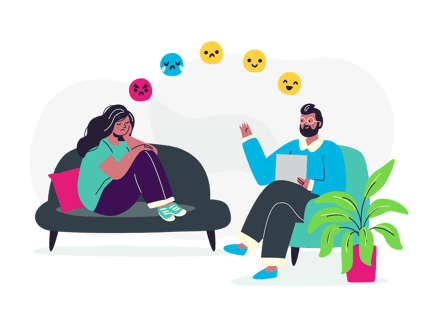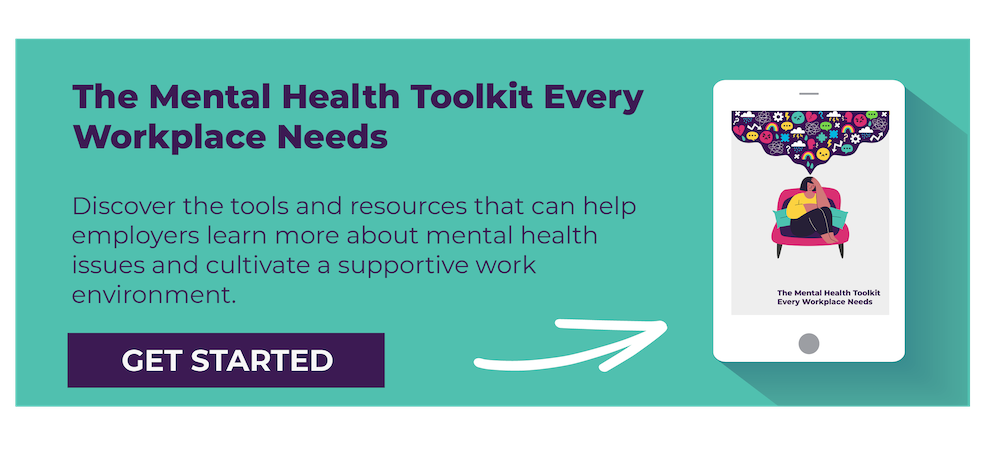 Whether you’ve given therapy a try or are looking to start therapy for the first time, knowing how to find a good therapist can make all the difference in how productive your sessions are.
Whether you’ve given therapy a try or are looking to start therapy for the first time, knowing how to find a good therapist can make all the difference in how productive your sessions are.
It’s important to know there’s nothing shameful about therapy either. In fact, more people are looking for answers in therapy more than ever. The prolonged pandemic has spiked the demand for licensed therapists.
Between August 2020 to October 2020, the American Psychological Association (APA) reported 84% of psychologists who treat anxiety have seen an increase in patients since March 2020. Additionally, depressive disorder treatments are up to 72% from 60%. Overall, 29% of psychologists' books have exploded with appointment requests over the last two years. Many provide remote services, making getting to therapy that much easier for working individuals.
Looking to improve your mental health? Consider this your essential guide to finding a good therapist to get you through tough times.
When is Therapy Helpful?
Psychotherapy is a great step toward learning valuable, life-long skills that can help you deal with real world problems. Whether you’re struggling with workplace anxiety, facing conflict, or don’t know what “next step” to take, a therapist can help you tackle a variety of issues. Sessions are often aimed at changing habits and behaviors to enhance an individual’s lifestyle for the better.
Starting the Therapy Search
Looking for a therapist can feel like an overwhelming task if you’re already stressed-out and burned out. Luckily, there are some tricks to narrow down the search so it’s a lot less arduous. Consider the type of counseling you need first: Individual, couple, or family. Then, move from there into searching for specialty psychologists or psychiatrists.
A few ways to make the search easier:
- Does the provider take your insurance?
- Are they accepting new patients at this time?
- What time frames can you meet? Are you flexible?
- Do you want a male or female therapist? Or does that not matter?
Some therapists will offer a free consultation call. This will allow you to get to know them a bit better. It will also help confirm if you have a similar communication style and if it may be someone you would feel comfortable with talking about difficult topics.
The Psychologist Locator on the website of the American Psychological Association and the National Register of Health Service Psychologists are two websites to start your therapist search on.
Two Experts Weigh in on How to Find a Good Therapist
“The best therapist for you is someone who fits your personality and who’s able to understand and help you with the particular issues you want to work on,” says Angela Ficken, a Boston-based psychotherapist and founder of Progress Wellness, LLC. “You don’t always find “the one” on the first date. Not every therapist out there is going to be “the one” either.”
you with the particular issues you want to work on,” says Angela Ficken, a Boston-based psychotherapist and founder of Progress Wellness, LLC. “You don’t always find “the one” on the first date. Not every therapist out there is going to be “the one” either.”
Here’s how to start your search in finding the therapist that’s right for you:
Ask Lots of Questions
Ficken advises people to think about how they can pinpoint what they need in a therapist. Create a few talking points and questions you have about therapy before diving into research and phone calls.
A few questions to consider:
- What time are you able to meet? Some therapists have evening and weekend availability, others do not. Do you have a strong day and time preference, or are your hours flexible?
- How important is the location to you? Do you want someone close to where you work, study, or live?
- Do you have a preference when it comes to therapy style? For example, would you like a therapist who is proactive during therapy sessions, who makes them feel more like conversations and discussions? Or are you looking for a therapist who is more passive, giving you most of the session to talk and providing small pockets of feedback periodically?
- Do you need to use your insurance for therapy sessions? Or can you afford to pay privately if the therapist you want to see is not on your insurance panel?
- What issues do you want to work on?
Once you understand your own preferences and needs, you can ask any potential therapists the following questions to feel out if they might be a good match for you:
- What is their availability? Does their schedule match yours?
- Where are they located? Do they have multiple offices?
- How would they describe themselves as a therapist? Are they more passive or proactive in sessions? Are they direct and blunt, or do they carefully guide people toward answers? Some therapists may also have a website that provides more information on who they are as a clinician.
- Do they take insurance? If so, which ones? If not, what is the out-of-pocket fee?
Note: If you need to use your insurance, you can also start your search by calling your health care provider and asking for the names of clinicians who are on your insurance panel. This is an easy way to narrow down your initial list of therapists to speak with.
- Do they treat what you are looking to work on? If so, how long have they been doing this type of work? And what methods do they use in sessions to help?
- Lastly, how do they sound on the phone? Does this person sound like they know what they are talking about? Do they sound helpful? Do you get a feeling that you click?
Ficken says it’s important to note that even the most well-researched options might not always be a perfect fit. She says there’s “no 100-percent guarantee that you’ll be able to feel out a good fit just by talking to someone on the phone for 10 minutes.” But, she says, that process of seeking out a therapist is important as it can help uncover what you need and eventually guide you to the therapist who is most helpful.
Look in Various Places
The best therapist for you might come from a friend’s recommendation. Or, it might be a recommendation from someone in a local social media group of yours. If you’re looking for a therapist, be open to different ways you might find the ideal fit.
Gail Saltz MD, Clinical Associate Professor of Psychiatry at The New York Presbyterian Hospital and host of the “How Can I Help?" podcast from iHeartRadio, says there are definitely multiple ways one can find a good therapist.
She advises checking with local hospitals’ outpatient psychiatry departments, the members’ list of the American psychiatric or psychological or psychoanalytic association lists, community health centers, and your primary care physician as a referral source.
Consider Online or In-Person
Thanks to the pandemic, many services went online, and that includes therapy. Think about if you want to meet with your therapist in-person or if you’re okay with meeting with them online. Often, online therapy provides more flexibility as you won’t have to drive anywhere and can fit sessions into your schedule as needed.
Ultimately, Dr. Saltz says, it doesn’t matter where you find them or if you see them in-person or online. What matters is consistency in therapy as directed by a professional therapist.
A Note on Changing Therapists
Already in therapy, but feel like it’s not working out? Listen to your gut or intuition. There are several instances in which it’s appropriate to stop therapy and look for a new therapist. It’s normal to switch therapists if you realize you are outgrowing your current one.
Additionally, other times you might change therapists:
- You’re moving
- Your therapist is unreliable
- Your therapist is distracted
- Your insurance isn’t accepted
- You’re not experiencing growth or change
- You leave sessions feeling discouraged often
Sometimes, you simply need change. That’s a normal experience in the therapy world. The right fit is out there if you take the time to do your research and are willing to give it a try again.
Use Therapy to Improve Mental Health
Psychotherapy is proven to work for those willing to put in the time and effort. Therapy can be messy work, but it’s also helpful for improving mental health. Around 75% of those who try psychotherapy find some benefit in it, according to the American Psychiatric Association.
If you feel your mental health is suffering, getting help now rather than later can make all the difference. Waiting until you’re on the edge of burnout or mental exhaustion can make it harder to get around to actually scheduling that appointment.
So, when should you call a therapist? Dr. Saltz says when disruption pops up.
“When a pattern of feelings, thoughts or behaviors is repetitively so disruptive that it interferes with your ability to function in one or more arenas of life [is when one might need to get into therapy],” she says. “If you are thinking about getting therapy, it often means you should.”



